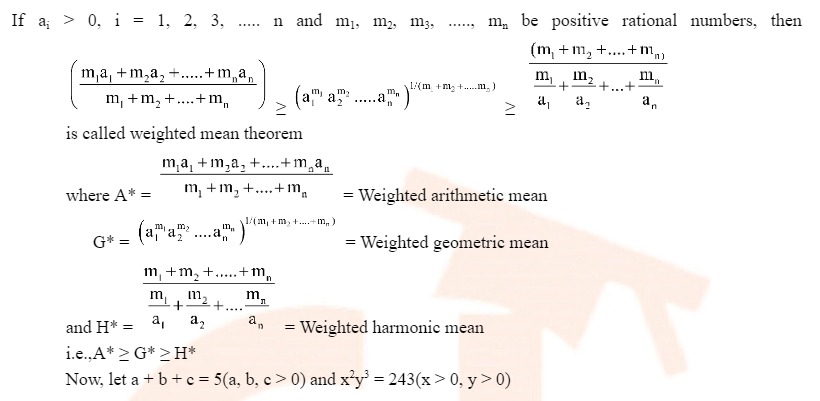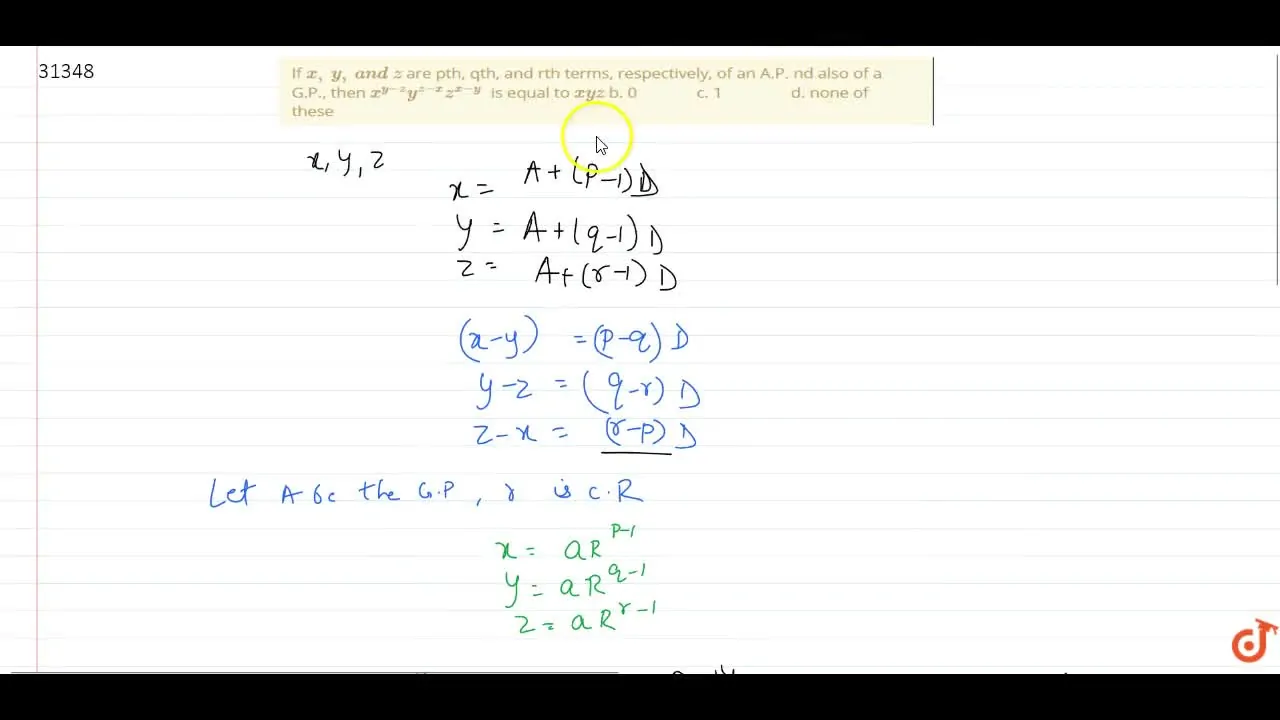
1. If x,y and z
are respectively the pth,qth, and rth terms, respectively, of an A.P. and also of a
G.P., then xy−zyz−xzx−y
is equal to
a. p
b. q
c. r
d. 1
2. If a,b,c,d are in GP and ax=bx=cz=du, then x,y,z,u are in
a. A.P.
b. G.P.
c. H.P.
d. none of these
Step by step video, text & image solution for 1. If x ,y and z are respectively the p_(th), q_(th), and r_(th) terms, respectively, of an A.P. and also of a G.P., then x^(y-z)y^(z-x)z^(x-y) is equal to a. p b. q c. rd. 12. If a,b,c,d are in GP and a^x=b^x=c^z=d^u, then x ,y,z,u are in a. A.P.b. G.P.<BR>c. H.P.d. none of these by Maths experts to help you in doubts & scoring excellent marks in Class 12 exams.
Related Playlists
- BOOK - ML KHANNACHAPTER - PROGRESSIONS EXERCISE - PROBLEM SET - 5 (Assertion/Reason)1videos
PROGRESSIONS
- BOOK - ML KHANNACHAPTER - PROGRESSIONS EXERCISE - PROBLEM SET - 5 (TRUE AND FALSE)5videos
PROGRESSIONS
- BOOK - ML KHANNACHAPTER - PROGRESSIONS EXERCISE - PROBLEM SET - 4 (FILL IN THE BLANKS)7videos
PROGRESSIONS
- BOOK - ML KHANNACHAPTER - PROBABILITYEXERCISE - MISCELLANEOUS EXERCISE6videos
PROBABILITY
- BOOK - ML KHANNACHAPTER - PROPERTIES OF TRIANGLES EXERCISE - Self Assessment Test (Multiple Choise Questions)34videos
PROPERTIES OF TRIANGLES
Similar Questions

1. The greatest value of ab3c is -
(a) 3
(b) 9
(c) 27
(d) 81
2. Which statement is correct -
(a) 15≥11a+3b+1c
(b) 125≥11a+9b+1c
(c) 15≥11a+9b+1c
(d) 125≥11a+6b+1c
3. The least value of x2+3y+1 is -
(a) 15
(b) greater than 15
(c) 3
(d) less than 15View SolutionIf x,y and z are pth,>h and rth terms respectively of an A.P and also of a G.P. then xy−z⋅yz−x⋅zx−y is equal to
View Solution
1. If x,y and z are respectively the pth,qth, and rth terms, respectively, of an A.P. and also of a G.P., then xy−zyz−xzx−y is equal to
a. p
b. q
c. r
d. 1
2. If a,b,c,d are in GP and ax=bx=cz=du, then x,y,z,u are in
a. A.P.
b. G.P.
c. H.P.
d. none of theseView SolutionIf x,y,andz are pth, qth, and rth terms, respectively, of an A.P. nd also of a G.P., then xy−zyz−xzx−y is equal to a.xyz b.0 c. 1d. none of these
View SolutionIF a,b,c are in G.P and a1x=b1y=c1z then x,y,z are in
View SolutionIf x,y,z are in G.P and ax=by=cz,then
View SolutionIf x, y ,z are in G.P. and ax=by=cz , then :
View SolutionIf x, y ,z are in G.P. and ax=by=cz , then :
View SolutionIf a,b,c,d be in G.P. and ax=by=cz=dw, prove that 1x,1y,1z,1w are in A.P.
View SolutionIf x,y,z are in G.P. and ax=by=cz ,then
View Solution


